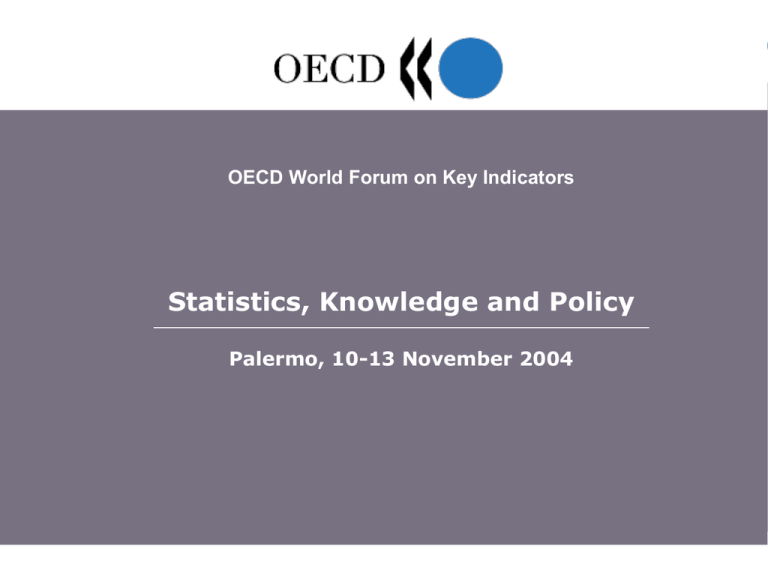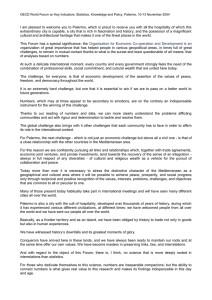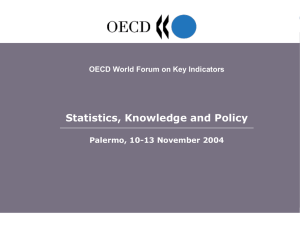Statistics, Knowledge and Policy
advertisement

OECD World Forum onon Key Indicators OECD World Forum Key Indicators Statistics, Statistics,Knowledge Knowledgeand andPolicy Policy Palermo, 10-13 November 2004 Palermo, 10-13 November 2004 OECD World Forum “Statistics, Knowledge and Policy”, Palermo, 10-13 November 2004 1 Indicators for EU policy making Pedro Díaz Muñoz Director, Eurostat OECD World Forum “Statistics, Knowledge and Policy”, Palermo, 10-13 November 2004 2 Indicators for EU policy making. Lisbon Objectives (23-24/3/2000) EU the most competitive and dynamic knowledge-based economy in the world Yearly synthesis report (Spring Report) from Commission Statistical Annex presenting a set of Structural Indicators OECD World Forum “Statistics, Knowledge and Policy”, Palermo, 10-13 November 2004 3 Structural Indicators Characteristics Decision Structure Relevant Easy to understand Available Comparable Reliable source Light burden Commission Services Council Committees (General Affairs, ECOFIN, Employment...) Eurostat The European Statistical System (ESS) OECD World Forum “Statistics, Knowledge and Policy”, Palermo, 10-13 November 2004 4 Structural Indicators Short List 2004 1. GDP per capita 2. Labour productivity 3. Employment rate 4. Employment rate of older workers 5. Youth educational attainment 6. Research and Development expenditure 7. Comparative price levels 8. Business investment 9. At risk-of-poverty rate 10. Long-term unemployment rate 11. Dispersion of regional employment rates 12. Greenhouse gas emissions 13. Energy intensity of the economy 14. Volume of freight transport OECD World Forum “Statistics, Knowledge and Policy”, Palermo, 10-13 November 2004 5 Eurostat Structrual Indicators Website OECD World Forum “Statistics, Knowledge and Policy”, Palermo, 10-13 November 2004 6 Role of the ESS Continuous Monitoring at high level: The Network Group of the Statistical Programme Committee Integration in planning activity: The EU Statistical Programmes Quality and feasibility Assessment The Quality Profiles OECD World Forum “Statistics, Knowledge and Policy”, Palermo, 10-13 November 2004 7 Quality profiles User-oriented criteria Feasibility: Timeliness and coverage Technical Soundness Accuracy and comparability Other characteristics Relevance Systemic criterion Development perspective OECD World Forum “Statistics, Knowledge and Policy”, Palermo, 10-13 November 2004 Overall Assesment Eurostat Quality grades A - Reliable source, high method. standards B –As A, comparability (country/time) problems C – Care in interpreting To be developed 8 Quality profiling The process Involvement of NSI´s through the Network Group of the SPC. Checking by sectoral Working Groups Official ESS recognition at Statistical Programme Committee level. Including development perspective and cost evaluation High visibility by publication on the Structural Indicators web-site OECD World Forum “Statistics, Knowledge and Policy”, Palermo, 10-13 November 2004 9 A/ EF TA EE Ca nd Co idat un e tri es US /JP M 2a Data availability: overview em St ber ate s Coverage 2004 1999 1995 1991 In general, data availability prior to 1995 cannot be expected for the new Member States and Candidate Countries OECD World Forum “Statistics, Knowledge and Policy”, Palermo, 10-13 November 2004 10 Conclusions Impact on the organisation of the ESS Need of harmonisation Solidarity to achieve complete coverage Joint response to political demands Coordination of programming activity Need for sustainable statistical information (supply) Enhanced quality assessment Use of official statistics OECD World Forum “Statistics, Knowledge and Policy”, Palermo, 10-13 November 2004 11

